Clindamycin Pediatric Oral: Uses, Side Effects, Interactions, Pictures ...
9 Sneaky Female Heart Attack Symptoms Women Might Be Ignoring
According to 2020 data in the Journal of the American College of Cardiology, "Cardiovascular disease remains the leading cause of death for women in the United States and worldwide." Paula Montana De La Cadena, MD, a Cardiologist at Miami Cardiac & Vascular Institute says one in three women die from cardiovascular disease, and 45% of women over age 20 years have some form of cardiovascular disease. "While symptoms can be different in women than they are in men, it doesn't necessarily mean that women have 'atypical symptoms' as it has been erroneously engrained," Dr. Montana De La Cadena says. "It just means that these symptoms in women have been potentially 'understudied.'"
"Female cardiovascular patients can often require a more nuanced approach and understanding of symptoms," explains Jayne Morgan, MD, cardiologist and the clinical director of the COVID task force at Piedmont Hospital in Atlanta, GA. "One size does not fit all," Dr. Morgan says. "Gender bias exists in cardiology, to the detriment of women."
13 Common Health Conditions That Affect Men and Women Differently
There's a big disconnect between what women think a heart attack would feel like—excruciating chest pain—and what it often does feel like. "Other than the reproductive system, the cardiovascular system has the most differences between genders," says Jean McSweeney, PhD, RN, professor and associate dean for research at the University of Arkansas for Medical Sciences College of Nursing in Little Rock, Arkansas. So it's to be expected that the female heart attack symptoms—while sometimes shared with men in a general sense—can also be experienced differently.
"We have much smaller vessels in our heart," says Dr. McSweeney, who was among the first to zero in on women's heart attack symptoms in a 2003 study, published in the journal Circulation. "And we're constructed differently."
According to Judith Hilevi Lichtman, PhD, department chair and associate professor of epidemiology at the Yale School of Public Health in New Haven, CT: When a woman's main arteries are blocked, she'll often experience a constellation of signs, including chest pain, pressure, or tightness, along with multiple non-chest symptoms. What's more, not every woman experiences the same symptoms, and the symptoms don't necessarily happen all at once.
A UCLA Heart Doctor Just Shared the Age When Many Women's Heart Disease Risk Increases
"Women's symptoms can be less dramatic than the crushing chest pain and tightness, and shortness of breath that drives most men to the hospital," Dr. Morgan says. "Instead they may manifest in nonspecific ways such as fatigue, jaw pain, back pain, or a common complaint of 'feeling rundown.'" Dr. Morgan says all of these are often attributed to life's stressors, the need for sleep, and more.
She adds that women have better outcomes when they're seen by a female cardiologist than a male cardiologist, but most doctors don't feel prepared in this department. "Only 22% of primary care physicians, and only 42% of cardiologists, feel well prepared to assess women's risk of cardiovascular disease," Dr. Morgan says, based on a 2019 nationwide survey of primary care physicians and cardiologists published in Current Treatment Options in Cardiovascular Medicine.
We spoke with experts and female heart-attack survivors about what some of those symptoms might be and what they feel like. These aren't entirely inclusive of every heart attack symptom a woman might experience, but they're nine that might surprise you.
The Best and Worst Diets for Your Cholesterol, Says UCLA Cardiologist
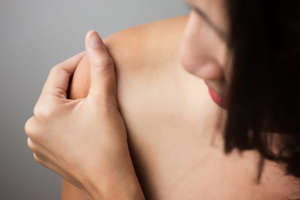 © Tharakorn/Shutterstock Woman pressing her hand against a painful shoulder A funky-feeling arm
© Tharakorn/Shutterstock Woman pressing her hand against a painful shoulder A funky-feeling arm "I felt like my arm was asleep," says Tara Robinson, a school counselor, who, incredibly, survived three heart attacks in one week at the age of 40. For the first two, the feeling would emerge for a couple of minutes and then go away. By the time she arrived at the hospital after the third—when the sensations were more intense and persistent—the symptoms were gone and she was sent back home without treatment. "I thought maybe I was working out too hard at the gym or I slept on my arm wrong," she says.
Another heart attack survivor, Lilly Rocha, described general soreness in her entire upper left side, in her arm along with her jaw and chest. Rocha was traveling a lot for her career and regularly flying internationally, so she attributed the soreness to the stress of travel. It wasn't until a co-worker (who had himself experienced a heart attack) insisted on taking her to a hospital did she realize the shocking truth: She'd just had a heart attack.
11 Signs You Might Be Headed For a Heart Attack
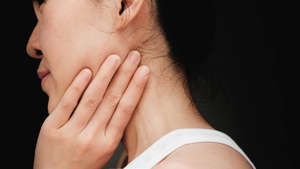 © ANN PATCHANAN/Shutterstock woman with cheek pain or chin pain.Acute pain in a woman Salivary gland . Female holding hand to spot of nape-aches. Concept photo with read spot indicating location of the pain. A really sore jaw
© ANN PATCHANAN/Shutterstock woman with cheek pain or chin pain.Acute pain in a woman Salivary gland . Female holding hand to spot of nape-aches. Concept photo with read spot indicating location of the pain. A really sore jaw Along with arm issues, fatigue, and shortness of breath, jaw problems often emerge months before an attack and then intensify during the actual event. "It's like the way your mouth feels after you've come home from the dentist and the Novocaine hasn't quite worn off," Robinson describes.
As with the arm, the jaw also acts up because of what doctors call "referred" pain, explains Suzanne Steinbaum, DO, attending cardiologist and the director of Women's Cardiovascular Prevention, Health, and Wellness at The Mount Sinai Hospital in New York City and author of Suzanne Steinbaum's Heart Book: Every Woman's Guide to a Heart-Healthy Life. "That pain comes from the heart," she says.
Dr. McSweeney recalls a patient who first complained about her jaw to her dentist and was given treatment for TMJ. When that didn't help, her wisdom tooth was removed. Of course, the pain only got worse—until she ended up in the hospital with a heart attack and was finally properly treated.
11 Silent Signs of Heart Trouble You Shouldn't Ignore
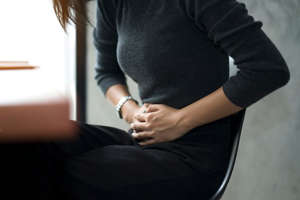 © NaruFoto/Shutterstock Business woman feeling painful from stomachache illness during working at office, hands touching her stomach and awareness of her Appendicitis sickness. Health insurance care. Insurance concept. Nausea and vomiting
© NaruFoto/Shutterstock Business woman feeling painful from stomachache illness during working at office, hands touching her stomach and awareness of her Appendicitis sickness. Health insurance care. Insurance concept. Nausea and vomiting In a 2018 Circulation study that examined women and men who experienced a heart attack before age 55, two-thirds of women said they'd experienced epigastric (upper-abdominal) issues, such as indigestion, nausea, or stomach pain, notes Dr. Lichtman, the article's lead author. Only half the men reported similar problems.
As Robinson describes that day she was rushed to the hospital with her third heart attack: "I wanted to vomit so badly." After treatment, she adopted lifestyle changes that included eating a heart-healthy diet—and she now helps lead other patients in living healthier.
 © fizkes/Getty Images woman taking a deep breath while sitting on couch at home Shortness of breath
© fizkes/Getty Images woman taking a deep breath while sitting on couch at home Shortness of breath An early symptom of a heart condition can be the need to prop yourself up in bed in order to breathe better. "You feel out of breath because when your arteries are blocked, there is not enough oxygen being delivered throughout the body," explains Dr. Steinbaum. "If the heart has been damaged or a heart attack is happening, the heart may not have the ability to push the blood forward and this can cause fluid to back up into the lungs."
15 Heart Attack Prevention Tips Every Woman Must Know
 © tommaso79/Getty Images woman laying on couch at home exhausted and worried Extreme fatigue
© tommaso79/Getty Images woman laying on couch at home exhausted and worried Extreme fatigue "Women tend to dismiss heart attack symptoms because we are used to feeling uncomfortable on a monthly basis," says Dr. Steinbaum. "The key to knowing when to get checked is to assess whether the things you do every day, and are normal for you, suddenly become difficult or you get symptoms while trying to do them." Robinson remembers having to crawl back to her bedroom after cleaning her shower; she felt weak and wanted to take a nap.
Dr. McSweeney tells of one patient who reported being so tired that she could only make one side of the bed. She needed to rest before making the other. "It's not this pronounced in every woman," says Dr. McSweeney, the lead author of the American Heart Association's Scientific Statement on women and heart disease. But if the fatigue gets progressively worse, or you don't feel better after you've slept, you should see your doctor.
It's easy to write off fatigue as a side effect of life—aging, working, caring for children and parents (sometimes simultaneously) and other general life stresses. For women, the hormonal changes of perimenopause and menopause can be exhausting. "In the many discussions of health equity, a large, underserved, and poorly managed population in medicine and clinical trials is the menopausal woman," Dr. Morgan says. "During menopause, lipid levels rise, and women's risk of heart attacks only further increases." In short: It might not be "just fatigue."
This Is Exactly What to Do If You Think You're Having a Heart Attack
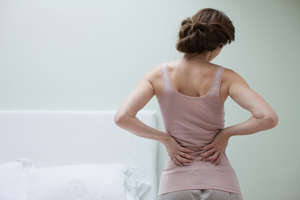 © Tom Merton/Getty Images Upper-back pain
© Tom Merton/Getty Images Upper-back pain Robinson reports that her back problem was the only symptom she'd describe as actually painful. "It felt as if it was behind my heart," she says.
Other women have described it as a sharp pain between the shoulder blades, which intensified at the time of the heart attack. Here are nine physical and emotional ways female heart disease is different.
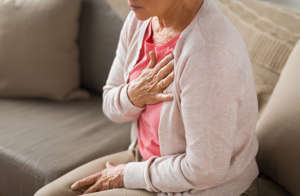 © Syda Productions/Shutterstock old age, health problem and people concept - close up of senior woman suffering from heartache at home An odd feeling in the chest
© Syda Productions/Shutterstock old age, health problem and people concept - close up of senior woman suffering from heartache at home An odd feeling in the chest Women don't necessarily describe it as "chest pain." "They may call it 'chest tightness' or 'chest pressure,'" says Dr. Lichtman, who adds that women may not associate their symptoms with a heart attack because they're experiencing other symptoms unrelated to the chest, like fatigue or muscle pain.
"I felt a strong tingling sensation," Rocha recalls. "Almost like electricity was shooting out of my chest." She recalls that the sensation would come and go, and in the beginning would lasted two or three minutes at a time.
About six months before her heart attack, Rocha went to her primary care physician (who was also her OBGYN) because she was convinced she had breast cancer. The doctor did a breast exam, found nothing, and sent her home. Rocha eventually noticed that her entire left side—chest, jaw, and arm—just felt "weird."
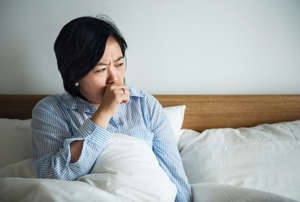 © Rawpixel.Com/Shutterstock A woman coughing Flu-like symptoms
© Rawpixel.Com/Shutterstock A woman coughing Flu-like symptoms "Women might say, 'I'm so tired. I must have a virus,'" says Dr. Steinbaum. They might convince themselves that all they have are flu symptoms, many of which resemble the conditions above, including body aches, fatigue, and nausea, which can also be signs of menopause and dismissed.
Trust that you know your body. If the sensations seem different or more intense than anything you've felt before, get it checked out. While they may turn out not to be symptoms of a heart condition or precursors to a heart attack, you're better off ruling out the possibility—even if you're under 55 and especially if you have a family history of early-onset heart disease.
6 Clear Signs You're Getting Sick
High blood pressureDuring pregnancy, many women experience pre-eclampsia, eclampsia, hypertension, or even gestational diabetes, and Dr. Morgan says this is this is akin to failing a stress test. "After the healthy baby is delivered safely, these women should be referred to a cardiologist for follow-up because their risk of heart disease is now twice as high as a woman who did not experience these complications," Dr. Morgan says. "But many women still do not receive the specialty care they deserve after delivery."
Dr. Montana De La Cadena points out that high blood pressure or hypertension puts women approximately three times at a greater risk of developing heart failure. "What's extremely important to emphasize is that there are cardiovascular risk factors unique to women that most female patients don't know about," she says. "These conditions include hypertensive disorders like pre-eclampsia, as well as gestational diabetes, pre-term birth, pregnancy loss, premature menopause and polycystic ovarian syndrome."
Women who have had these complications during pregnancy should follow-up with their primary care physician to monitor hypertension and diabetes. Their increased risk for developing cardiovascular diseases should be considered in hopes of preventing cardiovascular disease.
Additional writing and reporting by Jaime Stathis
The post 9 Sneaky Female Heart Attack Symptoms Women Might Be Ignoring appeared first on The Healthy.
Signs And Symptoms Of A Heart Attack
A heart attack—also known as a myocardial infarction—is a medical emergency that occurs when there is a loss of blood flow to your heart. Without adequate blood flow, your heart's tissues lose oxygen very quickly and your heart isn't able to pump blood throughout your body. As a result, you can experience symptoms such as chest pain, shortness of breath, nausea, and lightheadedness.
Heart attacks most often occur due to a plaque (cholesterol) build-up within your coronary arteries (blood vessels supplying blood to the heart muscle)—which is a heart disease known as coronary artery disease (CAD). While most people experience some symptoms during a heart attack, it is also possible to have a heart attack without having any symptoms at all. This is known as a silent heart attack.
Keep in mind: if you or a loved one is showing symptoms of a heart attack, it's paramount to call for medical help as soon as possible. Without treatment, a heart attack can lead to death. That's why knowing the signs is so important.
The hallmark symptom of a heart attack is chest pain. This can feel like squeezing or tightness in the chest and may last anywhere from a few minutes to several hours. Chest pain can feel different from person to person. Some people may describe it as a dull ache that comes and goes and others may feel a throbbing pain that comes on suddenly. Typically, you might experience pain in the center or left side of your chest.
It's important to note that chest pain is not only a symptom of heart attacks. You might experience chest pain because of muscle strain, heartburn, and panic attacks. If you are experiencing chest pain or discomfort for longer than a few minutes, it's best to not delay seeing your healthcare provider, especially if you have an underlying heart condition.
Shortness of breath may occur with or without chest pain, and sometimes it may be the only symptom a person experiences when having a heart attack. Feeling short of breath can make it difficult to walk, carry out daily tasks, or even have a conversation with someone. You may feel like you are working hard to catch your breath even while resting.
Like chest pain, shortness of breath does not only occur during a heart attack. It may also occur due to heavy exercise, anxiety, and asthma attacks. If you have shortness of breath that doesn't go away once you are at rest or treat underlying anxiety or asthma, it's a good idea to see a healthcare provider as soon as you can to determine the cause.
It's common to experience other types of pain outside of chest pain when having a heart attack. Many people may feel discomfort, soreness, or aching in their arms, neck, back, jaw, and stomach. You may not experience discomfort in all of these areas at the same time and it's common for the discomfort in your upper body to come and go.
Some studies are currently focusing on why upper body discomfort happens in the first place. Researchers have been investigating the role of the vagus nerve during a heart attack. The vagus nerve is responsible for sending information from your heart to your brain. Early theories suggest that upper body discomfort may happen because your arms, neck, and stomach are located close to your heart.
Some people can also experience cold sweats during a heart attack. These can occur when you feel cold and sweaty at the same time, but do not have a fever. However, cold sweats are common with several types of conditions and situations, including strenuous exercise, extreme stress, and low blood sugar. Experts suggest that sweating can happen during a heart attack because your fight-or-flight response becomes activated, which tells your brain that your body is under illness or threat.
During a heart attack, feeling sick to your stomach or queasy is a common experience. Feeling nauseous can also make you vomit.
If you're experiencing nausea by itself, especially without the presence of chest pain or shortness of breath, this usually is not a cause for concern. In fact, nausea is a common symptom for several health conditions such as headache, indigestion, and pregnancy. However, women sometimes experience nausea as their only heart attack symptom.
Lightheadedness or dizziness may also occur during a heart attack. While this symptom may be less common than chest pain or discomfort, it should not be ignored. According to the American Heart Association, lightheadedness can be a symptom of serious conditions such as a heart attack, stroke, cardiomyopathy (a type of heart disease), and atrial fibrillation (rapid and irregular heart rhythm).
Strokes occur when there is reduced blood flow to the brain. Cardiomyopathy is a heart disease that makes it difficult for your heart to pump out blood, which can often be the result of a heart attack. Atrial fibrillation is an abnormal heart rhythm where the heart beats too fast or irregularly.
The most common symptom of a heart attack for men and women is chest pain. However, it's important to note that people assigned female at birth often experience different symptoms than people assigned male at birth.
Women tend to experience pain in both arms, excessive fatigue, back pain, difficulty sleeping, flu-like symptoms, dizziness, and anxiety. Women are more likely to blame their symptoms on anxiety or stress—and as a result—are less likely to reach out for immediate medical attention. Unfortunately, women are also less likely to receive adequate care about a heart condition from healthcare providers.
While heart attack symptoms can vary from person to person, it is important to seek immediate medical attention if you or a loved one are experiencing symptoms. This is especially true if you or a loved one have chest pain, shortness of breath, or an underlying heart condition. These symptoms can be life-threatening if you don't receive proper treatment as soon as possible.
Heart attacks can look different for everyone and symptoms can range from unnoticeable to severely intense. The hallmark symptoms of a heart attack are chest pain and shortness of breath, however, nausea, upper body discomfort, and lightheadedness are also common.
Keep in mind: a heart attack is a medical emergency—meaning, you should call 911, visit an urgent care facility, or make a trip to the emergency department as soon as you or a loved one start experiencing symptoms. If the condition is left untreated, a heart attack can be fatal.
Heart Disease In Women Directory
Heart disease is the No. 1 killer in women, but few women understand their risk or what signs to be aware of. Women who are going through menopause or are postmenopausal are at higher risk than most other women. In women, symptoms of a heart attack are different than they are for men. Nausea, sweating, vomiting, chest pain -- these are signs to beware of. Follow the links below to find WebMD's comprehensive coverage about how heart disease affects women, how to protect your heart, signs of heart disease in women, and much more.
Medical Reference View All Features View All Video Slideshows & Images Quizzes News Archive View All



Comments
Post a Comment